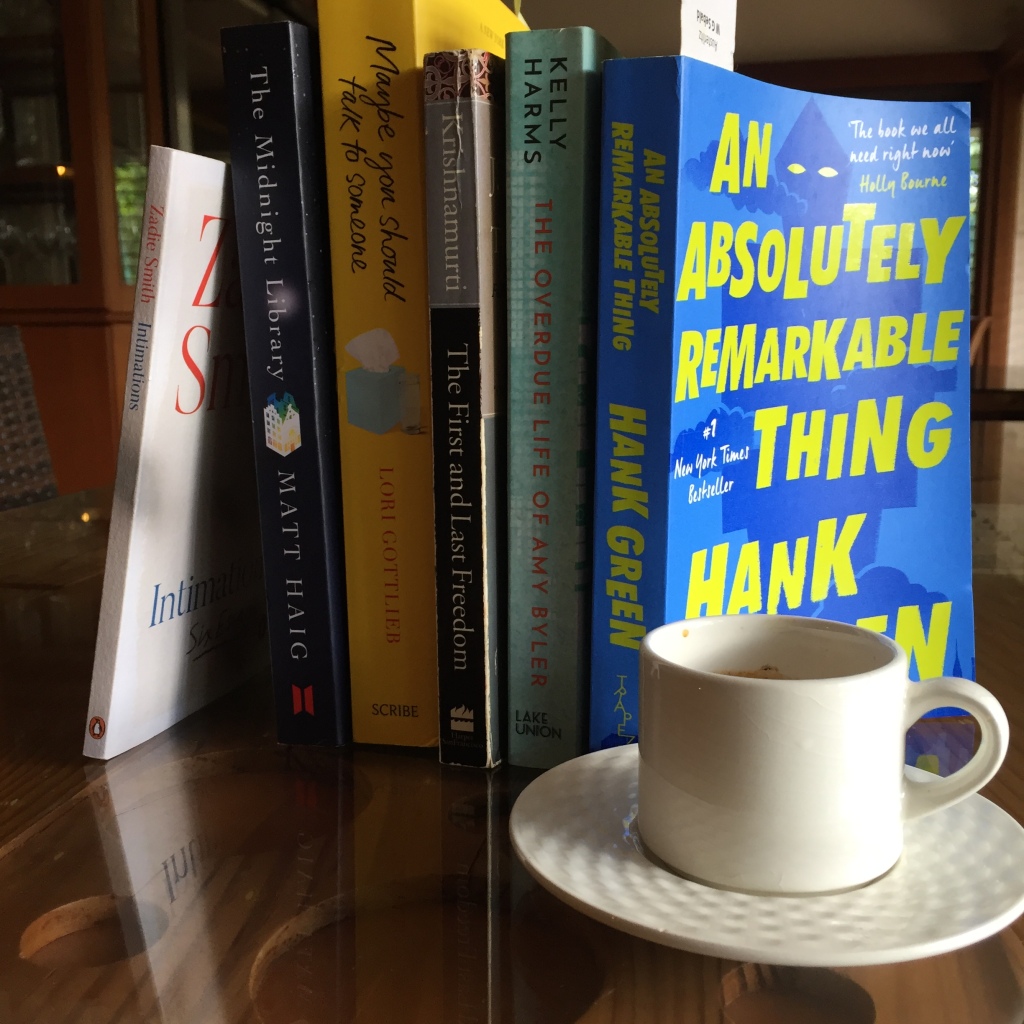
An Absolutely Remarkable Thing by Hank Green is a Science fiction that is about the impact of fame when a twenty-three-year-old artist gets swept away after twittering about sighting a giant humanoid sculpture in the wee hours of the morning in New York City. It is three a.m., after a tiring sixteen-hour day at a start-up, April May is heading home when she stumbles across a giant sculpture – like a ten-foot-tall Transformer wearing a suit of samurai armour. She immediately contacts Andy Skampt , a YouTuber who is her best friend from college days and she asks him to bring his camera. Andy persuades her to be in front of the camera as he thinks he is too goofy and people are not going to take him seriously. So together they film a quick video for YouTube and she names the creature ‘Carl’. The whole time she is in front of the camera, ahe is thinking of the artist ‘A fellow creator who had poured her soul into something truly remarkable that might simply be ignored by the whole world.’ The next day, April wakes up to a viral sensation and finds that the Carls have appeared in dozens of cities around the world. Aside from the New York Carl sighted by April May, there are sixty-four of them around the globe. They cannot find any surveillance footage that shows how these Carls get installed. The cameras that record audio have an undertone of static that plays ‘Don’t Stop me now’ by Queen if you turn up the volume and listen to it. Now the news stations are interested and they can charge a ten-thousand-dollar licensing fee per network if they agree to do interviews.
The gigantic sculpture is not about a piece of art. The story just keeps getting weird. When April looks up Wikipedia for the song by the British rock band, she discovers that ‘written’ is typed as ‘wrtten’ so being the good steward of the internet, she fixes the typo, and then reloads the page. She asks Maya, her roommate to look up the song on Wiki and this time there are two typos so they fix them and reload the page. When they bring up the Wikipedia page for the song again, a third typo appears and then when they fix it, the fourth typo appears. The missing alphabets are I, A, M, U. As the drama unfolds, Carl is asking for chemical elements : iodine, americium and uranium.
Then there is this interactive Dream that keeps recurring when she sleeps. Apparently many people are also having the Dream. April and her friends work to solve the codes and riddles of the Carls through the Dream. They need to figure out what the Carls are and what they want from us. Globally, there are also a dozen of communities talking about the riddles and puzzles and clues in the Dream so now people are out in the city solving these puzzles.
April steps up to be the spokesperson saying that Carls are harmless. She and her team are high on caffeine and feeling invincible. It becomes apparent that she has been chosen by an alien race to be their envoy. She gains millions of followers and the number keeps growing. But is being famous really worth putting her relationships and her safety at risk? There is a group led by Peter Petrawicki, a journalist, who thinks that Carl can be dangerous and a force that has invaded the cities and the human minds. He is urging the government and the people to exercise caution since no one has any idea what their intent is and where they are from. Peter has come up with a 20 pages long book entitled ‘Invaded’ and propagates that giant robot is a threat. ‘It made sense that a different perspective was going to feel more legitimate to people who were more afraid of otherness.’
The story is narrated in April May’s voice. Here are some musings that are insightful.

‘ I looked back to see the office building where the spawn point was located ----so high that, from my vantage point, it looked like it went on up forever, more than two hundred storeys. It’s weird to talk about these things as if they are fact since they were in a dream, but the fact that everyone experienced it in precisely the same way made it feel concrete. What is reality except for the things that people universally experience the same way? The Dream, in that sense, was very, very real. ‘
Here are April’s musings about fame.
‘ Most attributes a person has are, at least in some way, defined by them. They are good at soccer, they are funny they know a lot about the history of Rome, they have blond hair. Some of these things are things that person worked for, some are just things that they happen to have, but they are all characteristics of the person.
Fame is not this way.
Imagine if you looked different to every person who saw you. Not, like , some people thought you were more or less attractive, but one person thinks you are a sixty-five-year-old cowboy from Wyoming complete with boots and hat and leathery skin, and the next person sees an eleven-year-old girl wearing a baseball uniform. You have no control over this, and what you look like has nothing to do with the life you have lived or even your genome. You have no idea what each person sees when they look at you.
That’s what fame is like.
You think this sounds like beauty because we sometimes say that beauty is all in the eye of the one beholding the beauty. And, indeed, we don’t get to decide if we are beautiful. Different people will have different opinions, and the only person who gets to decide if I’m attractive is the person looking at me. But there is some consensus about what attractive is. Beauty is an attribute defined by human nature and culture. I can see my eyes and my lips and my boobs when I look in a mirror. I know what I look like.
Fame is not this way.
A person’s fame is in everyone’s head except their own. You could be checking into your flights at the airport and 999 people will see you as just another face in the crowd. The thousandth might think you’re more famous than Jesus.
As you can imagine, this makes fame pretty disorienting. You never know who knows what. You never know if someone is looking at you because they think you’re attractive or because you went to college with them or because they’ve been watching your videos or listening to your music or reading about you in magazines for years. You never know if they know you and love you. Worse, you never know if they know you and hate you.’
An Absolutely Remarkable Thing by Hank Green is a clever take about the internet world. It is a hilarious and fun read about the human response to the unknown and the dark side of social media. I look forward to reading its sequel.
On another note, what if there were infinite lives, would you like to explore the other possibilities?In The Midnight Library by Matt Haig , the protagonist, Nora Seed finds herself inside the Midnight Library when she is between life and death. The last update she has posted is 'I miss my cat. I'm tired.' She is now thirty-five year old. She has a degree in Philosophy and ends up working in String Theory, a shop in Bedford. Then Voltaire dies, she has just been told that she has been let go at her job. Her eighty-four year old neighbour tells her that he no longer needs her to collect his pills. The boy from the chemist has moved nearby and he can now drop them off for him. Suddenly she feels no one needs her and she is superfluous to the universe. She goes through her social media. 'No messages, no comments, no new followers, no friend requests. She was antimatter, with added self-pity.' She went on Instagram and saw everyone had worked out how to live, except her.' 'Old philosophy textbooks looked down at her, ghost furnishings from her university days, when life still had possibility. A yucca plant and three tiny, squat potted cacti. She imagined being a non-sentient life form sitting in a pot all day was probably an easier existence.'
At fourteen, she had been the fastest swimmer in the country at breaststroke and second-fastest at freestyle. She was also in the band with her brother. She gave up both her dreams as an Olympic swimmer and a lead singer of The Labyrinths. She was supposed to go to Australia with her good friend, Izzy and she did not go. When her mother died three months before her wedding to Dan , she suffered grief, anxiety and depression. The wedding seemed such a symptom of her chaotic feeling, she felt tied to a train track so she pulled out of the wedding. Once upon a time, she had also wanted to be a glaciologist.
"Go confidently in the direction of your dreams, live the life you have imagined", said Henry David Thoreau. Thoreau had been her favourite philosopher to study. 'But who seriously goes confidently in the direction of their dreams? Well apart from Thoreau'
Nora is in free fall and she has no one to talk to. She texts Izzy in Australia and within a minute, she knows her friend has seen the message but there is no reply. She has somehow forgotten that she is supposed to teach Leo, her own student guitar.She decides that she has no purpose to live for and that she is just crap at life. She decides to take her own life.
After she passes out, she meets Mrs Elm, her old school librarian who shows her her Book of Regrets. According to Mrs Elm, between life and death , there is a library and within that library, the shelves go on forever. Every book provides a chance to try another life you could have lived. Nora realises that there is no perfect life and before time runs out, she must answer the question: what's the best way to live?
There is one life where she meets Hugo and she is told about Schrödinger's cat who has said that in quantum physics possibility happens simultaneously. Hugo is also trapped between life and death and he has lived many lives and he meets an uncle in a video library. According to Hugo, ' .....the human brain can't handle the complexity of an open quantum wave function and so it organises or translates this complexity into something it understands.'
The Midnight Library is an interesting read that asks the question : Would you have done anything different, if you had the chance to undo your regrets? Matt Haig writes about the human condition, the good and the bad of it. Excellent read.
The book starts with a passage by Sylvia Plath.
' I can never be all the people I want and live all the lives I want. I can never train myself in all the skills I want. And why do I want? I want to live and feel all the shades, tones and variations of mental and physical experience possible in my life.'


No comments:
Post a Comment